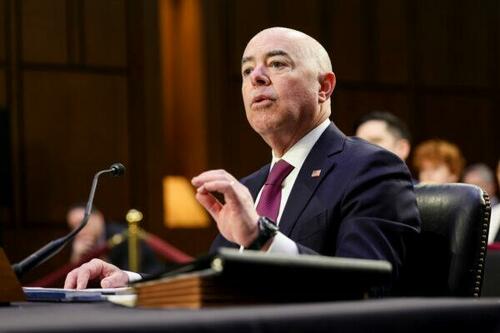House Republicans Say Homeland Security Chief’s $60 Billion Budget Concedes Border Cannot Be Secured
Authored by John Haughey via The Epoch Times (emphasis ours),
Any federal department head with a $60.4 billion annual spending request is going to see fiscal hawks on Congressional panels flash their budget-cutting knives in appropriations hearings.

But when it comes to embattled United States Department of Homeland Security (DHS) Secretary Alejandro Mayorkas—literally, the face of President Joe Biden’s much-maligned border and immigration policies—House Republicans don’t want to trim his budget, they want his head on a platter.
According to DHS, there have been 4.7 million “encounters” with illegal immigrants reported at the nation’s southern border since the Biden administration assumed office in January 2021.
An estimated 1.3 million “got-aways” have eluded border agents and escaped into the country—a figure many say is underestimated by up to 20 percent.
As a result critics, which include the entire Republican Congressional contingent as well as some Democrats, say there were more than 1,100 attacks on U.S. Border Patrol and Customs and Border Protection (CBP) agents while the flow of fentanyl remains unabated across the southern border, contributing to more than 75,000 poisoning deaths attributed to the drug in 2022.
“Mr. Secretary, you are failing at doing your job. These numbers speak for themselves,” Rep. Ashley Hinson (R-Iowa) said.
“The policies of this administration have directly contributed to this failure. In my mind, it is very clear this has been a complete failure in you doing your job and we need new leadership.
“What will it take for you to resign and step down from this … because I see this as a complete failure. What will it take?” Hinson asked.
Mayorkas didn’t directly respond to Hinson’s query during his two-and-a-half-hour March 29 hearing before the House Appropriation Committee’s Homeland Security Subcommittee.
Nor did the DHS chief answer pointed questions about allegedly shifting funding away from already allocated money for border wall construction, or respond to queries about whether Mexican cartels should be declared foreign terrorist organizations or his claim in April 2022 that DHS had “operational control” of the border. That statement was later refuted by U.S. Border Patrol Chief Raul Ortiz.
It was Mayorkas’s second Congressional hearing of the week and the first of two set for March 29.
The day before, he was ripped by Senate Appropriations Committee Republicans with Texas Sens. John Cornyn and Ted Cruz calling for him to “be fired” or, as a bill now circulating about Capitol Hill demands, be impeached.
“For over two years, we’ve seen skyrocketing illegal migration at the border. This policy-driven crisis continues for one reason, and one reason only, this administration is unwilling to publicly dissuade migrants from coming to the border and unwilling to take action on the authority it already has on the books,” Subcommittee Chair Rep. Dave Joyce (R-Ohio) said.
“The Biden administration’s policies are undoubtedly driving our border security crisis,” he continued and referring to the DHS’s $60.4 billion Fiscal Year 2024 (FY24) budget request added, “It is our job as appropriators to be good stewards of taxpayers’ money and to ensure we are not wasting money by supporting bad policies that don’t result in deserted outcomes.”
Budget of Wasteful ‘Gimmicks’
DHS’s FY24 budget request actually tops $103 billion with $60.4 billion defined as “discretionary.”
The department’s 260,000 employees deal with a wide range of domestic security concerns addressed by the Transportation Security Agency, the Coast Guard, FEMA, and the Secret Service.
“This proposal is, unfortunately, more disappointing than it is promising,” Joyce said. “The budget is full of gimmicks that mask the true cost of protecting the homeland and makes our job as appropriators that much more difficult.”
The department’s total $60.4 billion budget request is “nearly equal to the current fiscal year,” he said but cited the $4.7 billion for the proposed Southwest Border Contingency Fund and another $1.6 billion in “illegal TSA fees” as wasteful allocations that will cost taxpayers more than $6 billion without addressing border security.
“Now is not the time for budget gimmicks,” Joyce said.
Demurrals On The Wall
Republicans called the Southwest Border Contingency Fund a “slush fund” with Joyce claiming it “will spend more hard-earned tax dollars to achieve the same results with less oversight … that incentivizes this administration to not solve problems and do their job in the first place.”
The Biden administration is more dedicated to building more infrastructure for processing illegal immigrants “and then releasing them into the interior, [which] hasn’t worked,” Joyce said.
“Decreasing detention capacity hasn’t worked. Border security operators have been clear—without [increasing detention capacities] illegal immigration will continue unabated.”
Rep. Michael Cloud (R-Texas) said the $4.7 billion fund is “disturbing” because it essentially concedes the border cannot be safeguarded.
“What has happened under this administration is instead of trying to stop the flow of illegal immigrants across the border, we’ve just gotten better at processing those immigrants,” he said.
Cloud, House Appropriations Committee Chair Rep. Kay Granger (R-Texas), and Rep. Michael Guest (R-Miss.) accused Mayorkas of funneling money from revenue streams dedicated to building the border wall established under the Trump administration to other programs and projects.
Granger said there is $2.8 billion set aside to “complete the wall” with $200 million of that set to “go away” unless it is spent “in the next few months.”
“We just going to let that happen?” she asked.
Mayorkas would not answer the question but said he has approved 129 “gates and gaps” projects along stretches of the wall that already exist.
The Biden administration is not going to approve any more wall construction, he said, and is espousing technologies, such as drones, and “investing in personnel.”
“I have approved a number of projects and we will comply with our legal obligations with respect to the funds provided for the wall,” Mayorkas said.
Cloud said DHS prevented Texas from funding portions of the wall on its own. “Right now,” he asked, “we’re paying for [the] border wall to be stored and not built. Is that correct?
“We are indeed,” Mayorkas said.
Cloud said Border Patrol and CPB officials themselves say, “the border wall is the most effective force-multiplier” claiming the budget request “takes money we’ve already allocated and moves it in different directions, is that correct?”
“We will comply with our legal obligations,” Mayorkas said.
“It’s not people or infrastructure. It’s both,” Cloud said. “You are taking what we already appropriated for border wall construction and rescinded that and want to use that for other purposes. Is that correct?”
“Congressman,” Mayorkas replied, “we will comply with our legal obligations.”
“That’s a well-worded way to get around” answering the question, Cloud said. “You’re missing the overall objective of securing the border by funding these little legal loopholes to get out of things.”
“I understand we are not going to build a wall from sea to shiny sea,” Guest said, but a wall is effective in certain places in certain sectors.
“It seems to me this administration is saying we are not going to build any walls. Walls are bad. I disagree with that, walls are beneficial. I think that they do a great job.”
Fire ‘Border Czar’ Too
Hinson said the Border Patrol is budgeted for 19,800 agents but now has only about 19,000. She said Ortiz maintains it needs at least 22,000 agents to effectively patrol the border.
She said DHS should be asking for many more agents, which is an initiative his GOP critics would support.
Mayorkas said the Border Patrol added 300 agents last year and will continue to build its ranks every year. “There is a limit to how many we can functionally hire in a particular year.”
He said, “We need more.”
Good luck, Hinson said. “The policies of this administration have truly affected retention” and said the budget reflects “a lack of meaningful work to address retention challenges. Throwing out increased numbers looks nice, but it doesn’t actually address the reality of the situation at the southern border.”
Rep. Andy Harris (R-Md.) suggested if the administration needs more money to hire Border Patrol agents, he has some ideas.
“It’s strange that this department wants to add 350 Border Patrol agents and 87,000 armed IRS agents,” he said, suggesting Mayorkas contact the IRS “and see if it wants to share some of that wealth with you and perhaps share some of the funding with you.”
Harris said Mayorkas should not be the only administration official to resign over the border situation. Vice President Kamala Harris, as the designated “border czar,” should also step down, he said.
“The last time she was [at the border] was June 2021, that’s more than 2 million crossings ago,” he said. “Our border czar should also resign because she isn’t doing her job.”
Tyler Durden
Fri, 03/31/2023 – 19:40
via ZeroHedge News https://ift.tt/a9zCOgQ Tyler Durden






















